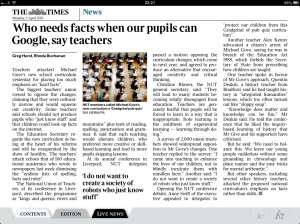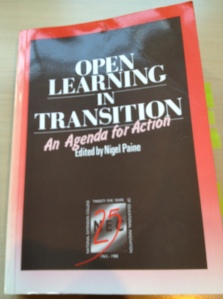This weekend I happened to come across a copy of this book, Open Learning in Transition – An Agenda for Action edited by Nigel Paine. Published in 1988 it includes a series of articles that give an overview of open learning and future trends as well as some history around the formation of the National Extension College, analysis of open learning methods and action for the future.
With all the talk of MOOCs and the future of education, it’s interesting to read something that was published 25 years ago and reflect on whether messages being proclaimed back then were listened to and taken on board. One of the articles that I’ve read so far ‘Education and the information revolution’, was written by Shirley Williams in which she considers the role of the teacher. She says:
… Teaching in schools has mainly consisted of imparting information, much of it to be memorised by the pupil. But information technology provides a prodigious capacity to memorise facts, and can provide up-to-date factual information on virtually any subject at the touch of a keypad. So spending a great deal of education time on learning facts is wasteful. That does not make the teacher’s role less important, but it does alter it fundamentally. It is the tutorial role that matters now, exploring, assisting and inspiring discussion among pupils, not the role of the instructor. Such teaching is more demanding, but also much more fulfilling. The emphasis in examinations too must change, as it is beginning to do, away from regurgitation of factual information in a limited number of subjects, towards a broader foundation of knowledge, covering both the sciences and the arts, in which the pupil’s creative and critical faculties are developed. …
Fast forward 25 years and this was what I read in Times this morning was, ‘Who needs facts when our pupils can Google, say teachers’.
 This piece reports on teachers having a go at Michael Gove’s new school curriculum for placing far too much emphasis on ‘hard facts’. This is a view echoed by 100 educational academics who’ve recently written to newspapers highlighting the dangers of the new national curriculum proposals and how it could damage educational standards. Both pieces highlight, as William’s does, the need to develop creativity and critical thinking.
This piece reports on teachers having a go at Michael Gove’s new school curriculum for placing far too much emphasis on ‘hard facts’. This is a view echoed by 100 educational academics who’ve recently written to newspapers highlighting the dangers of the new national curriculum proposals and how it could damage educational standards. Both pieces highlight, as William’s does, the need to develop creativity and critical thinking.
I think there’s a balance to be had in all of this, but I do agree with the need to develop creativity, critical thinking and problem solving skills, I think these are essential. 25 years ago people were talking about the information revolution whilst it was in its embryonic stages. We’re now living in the midst of it and the knowledge economy is a reality, but has our educational system grasped how it needs to change so that we can equip young people with the skills and passion to be lifelong learners? It’s somewhat heart sinking to see that 25 years on our educational system hasn’t fundamentally changed and it continues to be so driven by assessment and tests. With all the current talk of open education and MOOCs are we preparing our students for open lifelong learning?
